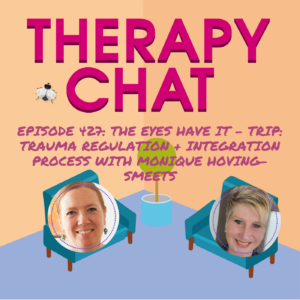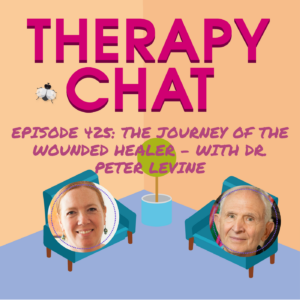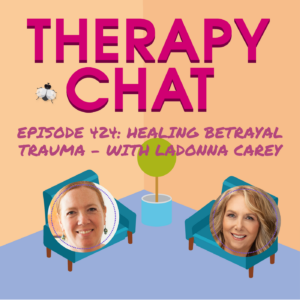Welcome to episode 146 of the Therapy Chat Podcast with host Laura Reagan, LCSW-C. This week Laura re-visits the issue of when your partner doesn’t understand trauma.
*The names and characters in this episode represent a composite of people I have know personally and professionally. No real person is represented in this episode, which is intended for educational purposes.*
When Your Partner Doesn’t Understand Your Trauma
Michael can’t understand it. He just doesn’t get what is going on with his wife of over 25 years, Amy. Michael is concerned about her and wondering when she is going to “get over” the childhood physical and sexual abuse she went through years ago. He really just wants her to be okay. And honestly, he’s sick of her trauma symptoms affecting her, him and their children. He’s not sure how much longer he can take it.
Why can’t she just get over it?
To be fair, Michael doesn’t realize that Amy’s mood and behavior are related to her childhood trauma. He just knows that despite years of therapy with various therapists, she sometimes becomes deeply depressed and can’t seem to get off the couch for days. Other times the smallest thing will seem to trigger her becoming highly anxious, which can turn into controlling behavior towards himself and the kids. She will sometimes go shopping, overspending with abandon even though they have agreed to stop running up credit card debt – then she hides it from him and acts like she is afraid he will hurt her when he receives the credit card bill. Although he does get really frustrated when this happens, it bothers him that she feels afraid of him at times, because he feels he would never harm her, and he never has gotten physical with her in more than 25 years. He also suspects she may be binging and purging, but they don’t talk about it. He’s afraid to bring it up and he suspects she would deny it if he asked.. Although she takes medication, her mood swings are still pretty unpredictable and he’s never really sure whether he is going to come home from work and find the smiling, got-it-together wife he married; or the disorganized, scattered, overwhelmed and controlling woman she sometimes becomes; or the sad, crying woman he barely recognizes who just wants to sleep as much as possible. He doesn’t know how to help her.
“She’s Changed.”
All Michael knows is that Amy has changed. He knew when they got married that she had a “difficult” childhood. He also saw how resilient Amy was then. Despite being abused throughout her childhood she had finished college and started a great career before they married. Although she spoke openly about having experienced that abuse, it didn’t seem to have a negative impact on her then. Other than acknowledging that it happened, she didn’t really talk about it. And he didn’t really want to talk about it – then or now – because just the thought of what she went through, particularly the sexual abuse, horrifies him. He’s not sure if the physical abuse was really all that bad, or why it affects her so much. He wonders if she is really trying in therapy, or whether she somehow is doing all this just for attention.
Michael isn’t sure how to deal with the emotions that come up for him when Amy is not okay. It reminds him of how he felt responsible for taking care of his mother after his dad died when he was 10. He would often come home from school and his mom would be sitting in the dark on the sofa in her bathrobe. He found himself needing to be adult-like to take care of her, and he was kind of on his own to take care of himself and his younger brother too. He was so relieved to get away from that unhappy childhood, to go to college and start his career, but sometimes he wonders if he married someone he will always have to take care of too. The burden of handling Amy’s emotional needs feels very heavy and familiar to Michael. He feels sad, hopeless and discouraged.
Image credit: Canva
She feels disconnected.
Amy, too, was overjoyed to leave her abusive family behind to marry Michael. She thought things would be so much better once she got away from her controlling, abusive father and her passive mother who was mostly focused on pretending everything was perfect. And things were so much better! She loved her career, she and Michael got along great, and she was very happy to raise her three beautiful children. However, when her third child, little Megan, turned 5 years old Amy started having flashbacks to the abuse that her father inflicted on her as a little girl. A part of her had always felt that she was somehow responsible for the sexual abuse and deserving of the beatings. But seeing her sweet, innocent little Megan, a bright, inquisitive kindergartner, she pictured herself as a little girl and wondered whether it was really true that an innocent child could ever be deserving of being harmed the way her father had harmed her. These thoughts were so sad and overwhelming she tried to push them away. Sometimes she was successful, but other times, particularly in the Spring, she was overwhelmed with fear and worry that something bad would happen to Megan or her two sons. She is bothered by nightmares, trouble sleeping and physical symptoms like Irritable Bowel Syndrome and a feeling that someone is watching her which makes her skin crawl. Sometimes she suddenly vomits, just out of the blue, and she never knows when a panic attack is coming. Much of the time she feels like she is going through the motions of life. She feels disconnected from her neighbors and the other moms in her community. She describes herself as “on the outside looking in” to her life. She doesn’t work outside the home now, and she’s not sure if she ever will again. Most of the time she feels like she is barely holding it together. She wishes Michael were more empathetic and supportive of what she’s going through but he doesn’t seem to understand why she can’t just “put the past behind her.” She feels alone and disconnected from him, and wonders what happened to the happy newlyweds they once were. She is sad and worried about the way she feels, but she doesn’t know what to do about it.
The Truth Is, They Are Both Struggling
This dynamic is all too common and I hear stories from both sides of the relationship described above in my office every day. Many of my clients are women like Amy who feel deeply ashamed that they are still affected by the abuse from their childhood years. And others are men like Michael who wonder if they can handle the emotional burden of their partner’s PTSD. Regardless of gender, both Amy and Michael could be any one of us. They both feel alone and don’t know how to reach the other partner.
Whether you can relate to Amy’s feelings or Michael’s, it’s helpful to understand a few things.
Three Things to Remember:
- You are not alone. Whether you are the person who experienced childhood trauma or the person who loves them, what you are feeling is common. Many people are affected by childhood trauma. It is so much more common than most of us realize. Click here to learn more about the Adverse Childhood Experiences Study (ACES) and the prevalence of childhood trauma.
- Trauma survivors aren’t trying to be difficult.They are actually just trying to feel normal. In the scenario I described above, both Amy and Michael are affected by childhood trauma, though neither of them understands the effects in depth. Amy could be described as the “identified patient” – she’s the one who is seen as having a problem and needing help. And she does need help. She is suffering so much. Amy’s trauma is that she was physically and sexually abused by an adult (her father) whom she trusted to take care of her and keep her safe. Her mother was unable to protect her and pretended nothing was wrong. So both of her primary caregivers, whom she depended on for safety and protection, let her down. She is affected by a loss of attachment as well as the effects of the abuse.
But Amy’s not the only one in this example who needs help. Michael, too, experienced childhood trauma. His father died when he was only ten, and in her grief his mother was unable to attend to Michael’s emotional needs. Instead, in order to be safe, Michael had to take care of his mom’s emotional needs, and his own needs were ignored. He also had a younger brother to look out for. So Michael experienced a loss of attachment when neither of his parents was available to take care of his emotional needs, as well as the trauma of his dad’s sudden death. It’s no wonder that Amy and Michael were drawn to each other, because they both had unresolved pain they were trying to escape when they met. However, Michael’s role as a caregiver in his family may have helped him feel comfortable marrying someone who he perceived as having gone through something terrible (without realizing how he himself was affected by his own trauma). Both Amy and Michael were young when they met, and they were both doing the best they could. They both wanted to be okay, and they were trying to be okay together. For a while they were, but the effects of trauma always pop up just when you least expect them. Neither Amy nor Michael is able to be a support for the other, because they are both affected by their own childhood trauma. They can both benefit from counseling with a skilled trauma therapist.
- Trauma therapy can help. The reason Amy has been in and out of therapy for 10 years without experiencing relief from her trauma symptoms is that she hasn’t had the right kind of therapy. 9 times out of 10, my clients with extensive trauma histories will tell me that their previous therapists never explained trauma to them or told them that their symptoms could be related to trauma. Why? The therapists probably didn’t know. Trauma is still a newer field of study, although its effects have been documented for years. Understanding that your symptoms are caused by trauma helps take an overwhelming set of symptoms that are seemingly unrelated and offers hope and clarity. You begin to recognize that you developed these coping methods (like dissociation, comfort eating, compulsive shopping, depression, anxiety) because of the effects of trauma, and not because there is something wrong with you.
Can You Relate?
You may be wondering if you are an Amy or a Michael. I can’t answer that for you, but here are some symptoms that may indicate that you are affected by childhood trauma.
If you have had some kind of disturbing experience in childhood that has always bothered you, for example:
- Loss of a primary caregiver
- Any unwanted sexual experience
- Any sexual experience you were too young to understand
- Witnessing violence, whether it happened to you, your caregiver or another family member
- Feeling that no one understood you, no one cared about you, or that you were abandoned, unwanted, or unloved
- Being bullied
- Receiving physical punishment, including spanking, beating, whipping, or being physically abused or harmed by an adult when you were a child
- Having a parent or primary caregiver who abused alcohol or drugs
These are just a few examples of situations that could be traumatic in childhood. Read this article for more, and consider taking the ACES quiz as well.
So if you have some kind of childhood experience you think might have been traumatic AND you have some of these symptoms:
- Trouble falling asleep or staying asleep, nightmares, sleep paralysis
- Feeling numb, detached, zoning out, trouble concentrating, easily distracted, losing time
- Memory issues – feeling forgetful, being disorganized
- Feeling a nagging sense that there is just something wrong with you, something that makes you different from everyone else
- Feeling like you are on the outside looking in
- Trouble feeling close with other people, trust issues, feeling suspicious of other people’s motives, thoughts like “no one can be trusted” and a feeling that it’s you against the world
- Panic attacks, anxiety, need to maintain control at all times, rigidity, need for order
- Feeling mistrustful of your partner, feeling judgmental and critical of others and yourself
- Body image issues, physical symptoms like chronic pain, stomach issues, migraines,
- Sexual problems – lack of interest in sex, shame related to sex
- Constantly on high alert, watchful, vigilant, can’t relax – you hate it when someone comes up behind you and touches your shoulder or stands too close to you
You might be affected by childhood trauma. No article can substitute for talking with a qualified therapist. If you are wondering if you are affected by childhood trauma, talk to a therapist. You can usually speak to them by phone before scheduling an appointment to make sure they feel qualified to help with the issue that affects you.
Here are some resources for finding a qualified trauma therapist:
National Child Traumatic Stress Network
Sensorimotor Psychotherapy Institute
Somatic Experiencing Institute
And here are some suggestions for further reading and learning:
The Body Keeps the Score by Bessel van der Kolk
In the Realm Of Hungry Ghosts by Gabor Maté
ACES Primer (video)
Finding a therapist who understands the effects of trauma on child development and has specialized training in trauma recovery can make a huge difference. Whether you are directly affected by childhood trauma or it is a problem for someone you love, therapy can help. You don’t have to keep suffering.
The first step is understanding that your trauma is real, that it matters, and that you can feel better. Then the hard part comes – trusting a therapist to help you. I know there are many caring and skilled trauma therapists out there who want to help. I am one of them. If you’re in the Baltimore area of Maryland, I would love to talk about how we can work together to help you feel better. Give me a call at 443-510-1048 or e-mail me at [email protected].
You can also contact me directly through my website at this link. Or visit my website to learn about how I work with trauma.
Please consider supporting Therapy Chat by becoming a member on Patreon! Just $1 a month would make a huge impact to keep Therapy Chat going strong! To learn more: https://patreon.com/TherapyChat – members get special perks and swag too!
Register now for the next Daring Way™ and Relational Equine Assisted Learning retreat: https://laurareaganlcswc.com/retreat
Leave me a message via Speakpipe by going to https://therapychatpodcast.com and clicking on the green Speakpipe button.
Thank you for listening to Therapy Chat! Please be sure to go to iTunes and leave a rating and review, subscribe and download episodes. You can also download the Therapy Chat app on iTunes by clicking here.




